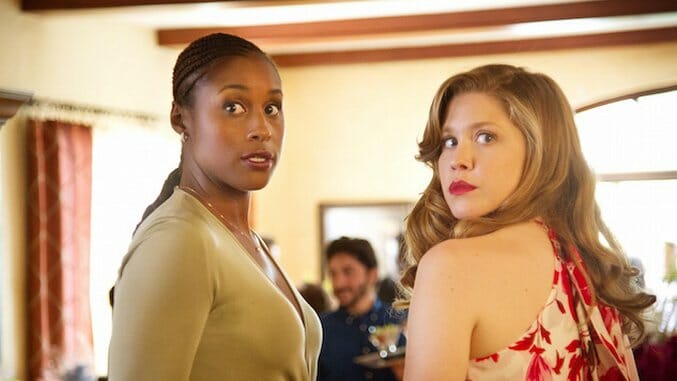With “Real as F—,” Insecure Shows Why Everyone Should Consider Therapy
(Episode 1.07)
HBO TV Features Insecure
Every week, critic Hari Ziyad breaks down the mechanics of a particularly excellent Insecure scene, joke or character. This week, it’s all about being okay with not being okay.
I need therapy. I’ve known this at least since I first went as a senior in undergrad four years ago, yet I haven’t been back sense.
When Molly runs into an old friend in “Real as F—” and the friend tells Molly she’s now in therapy, that need to go back, which I had buried, immediately resurfaced. But relaying the story to Issa in a later scene, Molly touches on why I have put off the urgency—or at least why I claim to have put it off—when she asks, “Who wants to go broke paying for a fake friend?”
A freelance writer’s life is full of unpaid invoices and inconsistences, and there aren’t many additional regular costs I can absorb at the moment. When I say I need to go to therapy, just thinking about how expensive it can be puts the brakes on that train of thought immediately. However, therapy can also be affordable, and I know this. At school, it was free, yet I didn’t go until senior year. There are affordable options offered through the National Institute for Psychotherapies that are well within my budget. But despite being aware of this, of my significantly increasing anxiety, and of the fact that I spend way more than I should on alcohol every week, I still haven’t gone back.
The truth of my refusal is probably less about the “going broke” and more about the “fake friend”. Therapy is still stigmatized as the last resort of a weak, desperate person with no real support of their own—no real friends. But there is a special kind of stigmatization that occurs within the Black community.
This stigma is encouraged by histories of racism in health professions and, for some, an overreliance on religion as the answer to all problems. Perhaps because Black folks felt we had nowhere else to turn at many points in our past, some of us look to our religions and churches as the only key to our mental and emotional wellbeing, and substitute prayer for action.
And while spiritual practices are also important to think about (another consideration I’ve too thoughtlessly buried away), they can’t fix everything for everyone. I understand that therapy is a legitimate way to deal with my problems, as it was a solution for me in the past, but it’s undeniable that socialization has affected how strongly I embrace this understanding.
Once I restart the train of thought about going back to therapy, what it always comes down to is that I generally have my shit together. I’m happy, for the most part. I have a great group of friends and family and I never want for support. I’ve been more successful at writing than I hoped when I started out, and my future career looks fairly bright. Meanwhile, the post-election world seems to be in the midst of a collective nervous breakdown that has not extended to me. And so, while I have a panic attack every once in a while, and probably (okay, definitely) have a slight (to moderate) drinking problem, and have no idea what I’m doing in romantic relationships, I am comparatively all right.
But “comparatively all right” doesn’t have to be the end of the conversation, especially when you still aren’t living the life you want to live. “Comparatively all right” is how Issa and Molly remain in their cycle of horrible decisions. Still upset by Issa’s insinuation that maybe she should try therapy, too, Molly brings up Issa’s own problems toward the end of the episode: “You’re over here talking like I’m raggedy and shit, telling me I need therapy, while your mess is all over the place.” To this, Issa retorts that Molly can’t keep a man because she’s impossible to please: “One minute, he’s too thirsty. The next minute, he’s too distant. The next, he’s too gay!”
Meanwhile, both of their love lives are shit, and they both end the episode as they have ended many of the six before: unhappy, lonely and broken, but comparatively all right.
I don’t know if therapy will fix their problems. Like religion, therapy is not a universal salve that works for everyone all the time. But considering therapy, especially if the only reason you haven’t considered it is stigma, is something we all should do, even if we eventually conclude it’s not for us.
If you don’t know where to start, my colleague Alexander Hardy recently outlined nine things to think about when beginning therapy. For me, I know there is no way I can do therapy with a straight white man, and Hardy helpfully outlines how it’s fine to draw such lines and how to go about doing so. He also explains that a therapist is not meant to be a friend, much less a “fake one,” which might be something someone like Molly needs to hear.
But what we all need to hear is that it’s okay not to be okay. It’s okay to ask for help. It’s okay to want a better life for yourself. And it’s okay to consider therapy as a step to get there. So don’t wait until your Lawrence finds you creeping and your Jered is too tired of dealing with your shit to consider it.
Hari Ziyad is a Brooklyn-based storyteller and the Editor-in-Chief of RaceBaitR. Their work has been featured on Gawker, Out, Ebony, Mic, The Guardian, Colorlines, Black Girl Dangerous, Young Colored and Angry, The Feminist Wire and The Each Other Project. They are also an assistant editor for Vinyl Poetry & Prose and a contributing writer for Everyday Feminism.